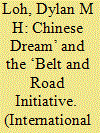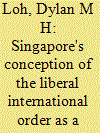|
|
|
Sort Order |
|
|
|
Items / Page
|
|
|
|
|
|
|
| Srl | Item |
| 1 |
ID:
191560


|
|
|
|
|
| Summary/Abstract |
The ‘Chinese Dream’ (CD) and the ‘Belt Road Initiative’ (BRI) are signature programs of President Xi Jinping. Much of the scholarships on these two projects have concerned itself with either domestic propagandistic effects or external foreign policy impact. These concerns have underpinned the literature’s focus on material expressions of such projects, be it through infrastructural construction in the case of the BRI or propaganda tools in the example of the CD. Yet, an important but understudied element of these two projects is the narratives that they tell and the impact of these narratives. In that regard, this article complements existing studies of the CD and the BRI by reading the projects as grand narratives. Drawing on international practice theory, I trace an explicit link between narratives and practices to demonstrate how narratives activate, anchor, produces and contest political practices of some sub-state actors in China. That is to say narratives: (i) serve as signposts for sub-state actors’ orientations in clarifying what are relevant/irrelevant and appropriate/inappropriate practices; (ii) provide ‘background’ stock of information where actors draw on to legitimize their practices when they speak of the BRI and CD; and (iii) create conditions for both the creation of new practices and contestation of existing ones. I then argue that four narrative-practice processes are seen in the Chinese example: contestation, sustenance, activation, and production.
|
|
|
|
|
|
|
|
|
|
|
|
|
|
|
|
| 2 |
ID:
160937


|
|
|
|
|
| Summary/Abstract |
Since the Cold War, South-East Asia has been marked by a period of relative calm and stability. Yet this peace belies ongoing tensions, mistrust and stress in the Association of Southeast Asian Nations (ASEAN) and among its member states. Within the scholarship on ASEAN, not enough attention is devoted to these underlying currents. How and in what way do tensions stress the ASEAN norms? What are some of the coping mechanisms adopted by ASEAN and its member states? Engaging with the scholarship on norms, the author contends that changes wrought in this relationship are both extra- and intra-mural. These have accelerated as contentious issues—particularly the South China Sea disputes—gain more visibility. The author argues that ASEAN is put under pressure, firstly, through a more muscular Chinese foreign policy that disrupts but does not yet break the fundamental norms of ASEAN and, secondly, through internal contestation over ASEAN norms that challenges the meaning of these norms. Essentially, the article gives an account of how internal and external pressures are burdening ASEAN norms but yet remain durable because of resistance against duress by the bloc and member states. This is done through an examination of instances where the established order and practices in the region were disturbed, and the response to this disturbance.
|
|
|
|
|
|
|
|
|
|
|
|
|
|
|
|
| 3 |
ID:
191741


|
|
|
|
|
| Summary/Abstract |
The liberal international order (LIO) is undergoing significant challenges, and this has given rise to debates about its purported decline. In this context, most studies of the LIO focus on major powers with little attention paid to small states’ conceptualizations of the LIO despite its ubiquity in international life. Focusing on the Singaporean case as a small state, it asks the question: how does Singapore conceptualize the LIO and what are the effects of this conceptualization? Through a mixed-method thematic analysis of 192 parliamentary replies, media interviews and United Nations speeches by Singaporean officials between 2000 to 2022, I find Singapore accepting and defending the existing international order in two main ways: demonstrating respect for international law and the UN Charter, and supporting economic liberalism. Meanwhile, Singapore is contesting the universality of liberal democracy as it sees such discourse as a rebuke to its single-party dominant governance model. This perception of the LIO, in turn, informs Singapore's order-maintaining, order-modifying and order-contesting practices: it seeks to not only protect, but also to modify the LIO—through institutional and legal initiatives—to make it more equitable and open, giving us a glimpse into an instance of a small state's agency in relation to the LIO.
|
|
|
|
|
|
|
|
|
|
|
|
|
|
|
|
|
|
|
|
|